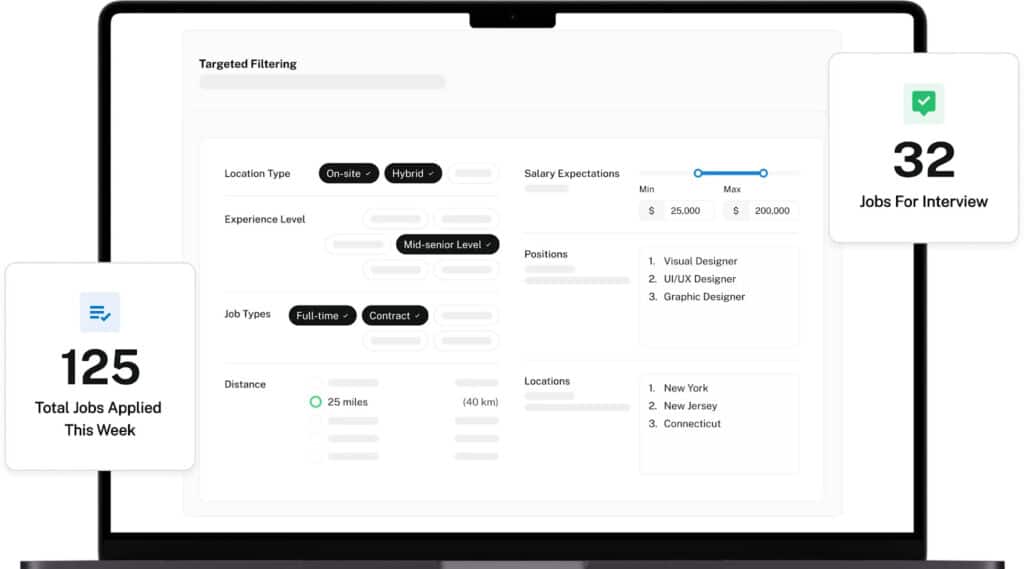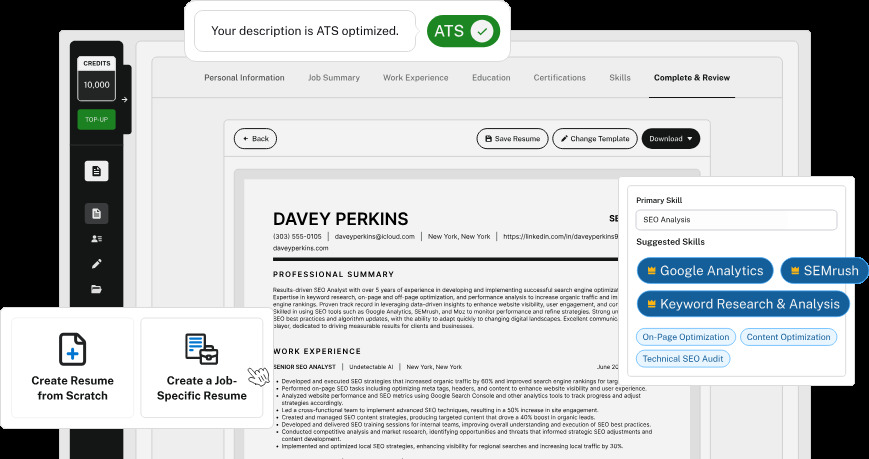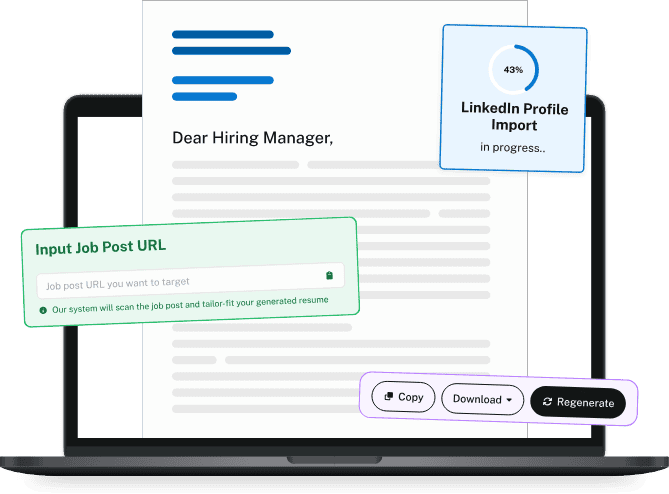Staying in your pajamas all day. Not commuting or driving to work.
Witnessing your child’s first steps. Aaaah, the perks of working from home.
These are just a few reasons why many people began to prefer working from home.
As soon as the COVID-19 pandemic hit, many companies had to create a new scheme to continue operations.
It created a huge shift within the global workforce and in our daily lives as well.
But finding legitimate remote opportunities isn’t that easy, as the market is filled with both excellent positions and disappointing scams.
So, how do you separate genuine opportunities from the noise?
What tools can streamline your search? And once you find promising positions, how do you prove yourself as the ideal remote candidate?
This comprehensive guide answers these questions and more.
We’ll walk through every step of finding and landing a work-from-home job that meets your needs and matches your skills.
Why Work-From-Home Jobs Are in High Demand
The landscape of work has changed dramatically. Just five years ago, most employees commuted to an office daily without question.
Now, remote work has become accepted and expected across many industries.
This shift isn’t temporary. A study by Upwork in 2019 projected that 22% of the American workforce would be working remotely by 2025.


Never Worry About AI Detecting Your Texts Again. Undetectable AI Can Help You:
- Make your AI assisted writing appear human-like.
- Bypass all major AI detection tools with just one click.
- Use AI safely and confidently in school and work.
Yet that number did change drastically, with 45.2% of American employees working remotely in 2024.
Companies that once resisted remote arrangements now embrace them, recognizing benefits beyond pandemic necessity.
Why has this transformation happened so quickly? The answer lies in technology and changing priorities.
Benefits of Working From Home
Remote work offers advantages that traditional employment simply can’t match:
- Flexibility that fits your life. Remote positions often allow you to structure your workday around your natural productivity peaks. Night owl? Early bird? Your schedule can finally align with your body’s natural rhythms. This flexibility extends to life events too. From doctor’s appointments to school pickups, you gain precious time to handle personal responsibilities without sacrificing professional commitments.
- Zero commute time. The average American spends 27 minutes commuting daily. That’s nearly 10 full days per year sitting in traffic or on public transit. Working remotely instantly converts this wasted time into hours you can spend on work, family, hobbies, or self-care. Plus, you’ll save significant money on transportation costs, work attire, and dining out.
- Location independence. Remote work frees you from geographical constraints. You can live where you want—near family, in a lower-cost area, or in your dream location—without sacrificing career opportunities. This ability to choose your environment can dramatically improve your quality of life.
- Improved work-life balance. Many remote workers report better overall well-being. The flexibility to take breaks when needed, prepare healthy meals with a slow juicer for home use, and incorporate exercise into your day contributes to both physical and mental health.
- Reduced workplace stress. Office politics, micromanagement, and constant interruptions take a toll. Remote work can minimize these stressors, creating a more focused environment where your work speaks for itself.
Skills Employers Look for in Remote Workers
Not everyone thrives in a remote environment.
Employers seek specific traits that indicate you’ll succeed without direct supervision:
- Self-motivation and discipline. Can you maintain productivity and meet deadlines without a manager physically present? Employers need confidence that you’ll deliver results consistently, regardless of location.
- Communication skills. In a remote setting, clear communication becomes even more important. Can you convey complex ideas in writing? Do you know when to switch from email to video call? Employers value workers who communicate proactively and effectively across digital channels.
- Technical adaptability. Remote work requires comfort with various digital tools. Beyond basic applications, you’ll need to quickly learn new platforms and troubleshoot technical issues independently.
- Time management mastery. Without external structure, managing your workday becomes your responsibility. Employers look for candidates who can prioritize tasks, avoid distractions, and maintain consistent output.
- Problem-solving independence. Remote workers can’t simply walk to a colleague’s desk for help. The ability to research solutions and resolve problems independently is invaluable.
Highlighting these capabilities in your application materials dramatically increases your appeal to remote employers.
But first, you need to find those opportunities.
How to Find Work-From-Home Jobs
Finding legitimate remote positions requires strategy. The good news is that several approaches can yield excellent results when used consistently.
- Job boards specializing in remote work have emerged as invaluable resources. Sites like FlexJobs, We Work Remotely, and Remote.co have verified remote opportunities across industries. Unlike general job sites, these platforms focus exclusively on flexible and remote positions, filtering out in-person roles that waste your time.
- Company career pages often list remote positions directly. If specific organizations interest you, check their careers section regularly. Many now include “remote” filters or dedicated remote work categories.
- LinkedIn’s remote job search has improved dramatically. Use the “Remote” location filter when searching, and set job alerts to receive notifications about new remote positions matching your criteria.
- Industry-specific communities often share remote opportunities before they reach major job boards. Join Slack groups, Discord servers, and forums related to your field. These communities not only post jobs but also provide invaluable insider information about companies’ remote work cultures.
- Networking remains powerful even in the digital age. Former colleagues, industry connections, and alumni networks can alert you to unadvertised remote positions. Make it known you’re seeking remote work, and be specific about your skills and desired role.
- AI-powered job application tools represent the cutting edge of remote job hunting. Platforms like Undetectable AI Smart Applier can transform your search from manual drudgery to effortless efficiency.

Here’s how it works: upload your resume, connect your LinkedIn, and set your preferences.
The AI instantly starts scanning job boards for matching roles, auto-generates tailored applications, and sends them out on your behalf.
While you’re practicing your interview pitch or brushing up on new skills, the system is applying to dozens of quality positions automatically.
You don’t have to babysit it, either. Nor do you have to rewrite the same boring email fifty times.
Each application is personalized enough to stand out and pass ATS filters without looking like a lazy copy-paste job.
And yes, it works while you sleep. Literally.
Instead of wasting hours on job boards, you focus on high-priority roles that deserve your personal touch.
Let the AI handle the mass applications and show up when it counts, with interviews already lined up.
Best Work From Home Job Categories
Remote work spans virtually every industry, but certain fields offer particularly abundant opportunities:
- Technology and development leads the remote revolution. Software engineers, web developers, UX/UI designers, and data scientists enjoy numerous fully remote options. The tech industry pioneered remote collaboration tools and practices, making it natural to extend these capabilities to its workforce. Entry barriers exist, but coding bootcamps and self-directed learning paths have made these careers more accessible than ever.
- Content creation and marketing thrive in remote settings. Writers, graphic designers, social media managers, and SEO specialists can complete their work from anywhere with an internet connection. Marketing teams increasingly operate across multiple locations, collaborating through project management platforms and communication tools.
- Customer service and support have embraced remote work across service levels. From entry-level representatives to specialized technical support, companies recognize that happy, comfortable agents provide better customer experiences. These positions often require less specialized education, making them excellent options for remote work.
- Project management and operations roles adapt well to remote environments. As tools for tracking progress and managing resources improve, physical presence becomes less necessary. Remote project managers coordinate teams across time zones, often achieving greater efficiency than their office-bound counterparts.
- Education and teaching opportunities expanded dramatically during the pandemic. Beyond traditional teaching, consider roles in curriculum development, educational technology, tutoring, and course creation. Many platforms connect subject matter experts with students globally.
- Finance and accounting professionals benefit from the digital nature of modern financial systems. Bookkeepers, accountants, financial analysts, and advisors can perform most tasks remotely. With secure communication channels and financial software, physical presence rarely adds value.
- Administrative support roles have evolved into virtual assistant positions. These jobs range from basic data entry to complex calendar management and travel arrangements. Many allow flexible hours and varying commitment levels, from part-time to full-time work. As demand grows, many businesses are now prioritizing hiring virtual assistant professionals to streamline operations while maintaining flexibility and cost efficiency.
When targeting your job search, consider which of these categories aligns with your existing skills and interests.
Each offers different entry points, compensation ranges, and growth trajectories. Focusing on a specific category allows you to tailor your applications more effectively.
Need ideas? We also go over 15 easy remote jobs worth checking out in another article.
How to Apply for Work-From-Home Jobs
Finding opportunities is just the beginning. Converting them into job offers requires strategic application techniques specific to remote positions.
1. Create a Professional Resume & Cover Letter
Remote roles are competitive. If your resume doesn’t clearly communicate “remote-ready,” it might not even make it past the first glance.
Our Resume Generator helps you build a job-specific, ATS-optimized resume in minutes.
Upload your existing resume or connect your LinkedIn profile, choose a template, and AI will handle the rest.

Spotlighting skills that matter for remote work, like self-management, communication, and experience with digital collaboration tools will highlight what employers actually want to see.
Once your resume is ready, you can instantly create a tailored cover letter using our Cover Letter Generator.

This tool doesn’t just give you a fill-in-the-blank template. It generates a fully custom cover letter based on your experience and the job description.
It emphasizes your familiarity with remote platforms like Slack or Zoom, your ability to stay productive outside an office, and your enthusiasm for the company’s remote culture.
With both tools, you’re not just speeding up the process—you’re upgrading the quality of every application you send.
2. Apply to Multiple Jobs Efficiently
Remote job hunting often requires volume. The more quality applications you submit, the better your chances of receiving interviews.
Undetectable AI Job Application Bot transforms this typically exhausting process. The platform:
- Scans multiple job boards using your criteria
- Identifies positions matching your qualifications
- Generates tailored applications for each opportunity
- Submits applications automatically while maintaining a personal touch
This approach lets you cover more ground without sacrificing quality.
The AI ensures each application addresses the specific job requirements, preventing the mass-application approach that rarely yields results.
To maximize the AI Job Applier’s effectiveness:
- Set clear parameters for your desired roles, industries, and compensation
- Regularly update your profile with new skills and experiences
- Review and refine automatically generated applications for high-priority positions
- Track which applications receive responses to refine your targeting
With the time saved through automation, you can focus on researching companies, preparing for interviews, and networking—activities that AI can’t replace but significantly impact your job search success.
3. Build an Online Presence
Remote employers will look you up, so a strong digital presence is essential.
Start with LinkedIn. Use a professional photo, update your experience, and optimize for remote roles by turning on “Open to Work,” listing remote tools under Skills, and mentioning “remote work” in your headline and About section.
Add recommendations that speak to your communication and self-management.
A portfolio site can also help, even for non-creative roles. Include project outcomes, case studies, and testimonials to prove what your resume says.
Depending on your field, build visibility on platforms like GitHub (devs), Medium (writers), Behance or Dribbble (designers). These show you’re active in your craft.
Finally, audit your public social profiles. Clean up anything unprofessional and engage thoughtfully on platforms that reflect your industry.
4. Prepare for Virtual Job Interviews
Remote interviews are as much about tech readiness as qualifications.
Check your gear: webcam, mic, lighting, internet, and power backups. Use a clean, quiet space or a professional virtual background, and dress appropriately, even if it’s just an audio call.
Expect remote-specific questions like:
- “How do you stay focused at home?”
- “How do you manage time and communicate remotely?”
- “What tools do you use for organization?”
Also, research how the company operates—some prefer set hours, and others are synced across time zones. Tailor your answers to match their style and show you’re aligned with their remote culture.
Logged In, Locked In
Finding and securing work-from-home jobs requires strategy, tools, and persistence.
The remote landscape continues evolving, creating opportunities across industries and experience levels.
The most successful remote job seekers combine traditional methods with innovative tools like Undetectable AI’s suite of AI-powered applications.
This balanced approach allows you to cover more ground while maintaining the personal touch that ultimately secures job offers.
Remember that remote work requires demonstrating your capabilities differently. Employers need confidence you’ll thrive without direct supervision.
Emphasize your self-management, communication skills, and technical adaptability throughout your application materials and interviews.
Ready to begin? Start by identifying which remote job categories align with your skills and interests.
Then, leverage the tools we’ve discussed to transform your job search from overwhelming to efficient.
Your ideal work-from-home job awaits—you just need the right approach to find it.
Make sure to check out our AI Detector and Humanizer conveniently in the widget below!
